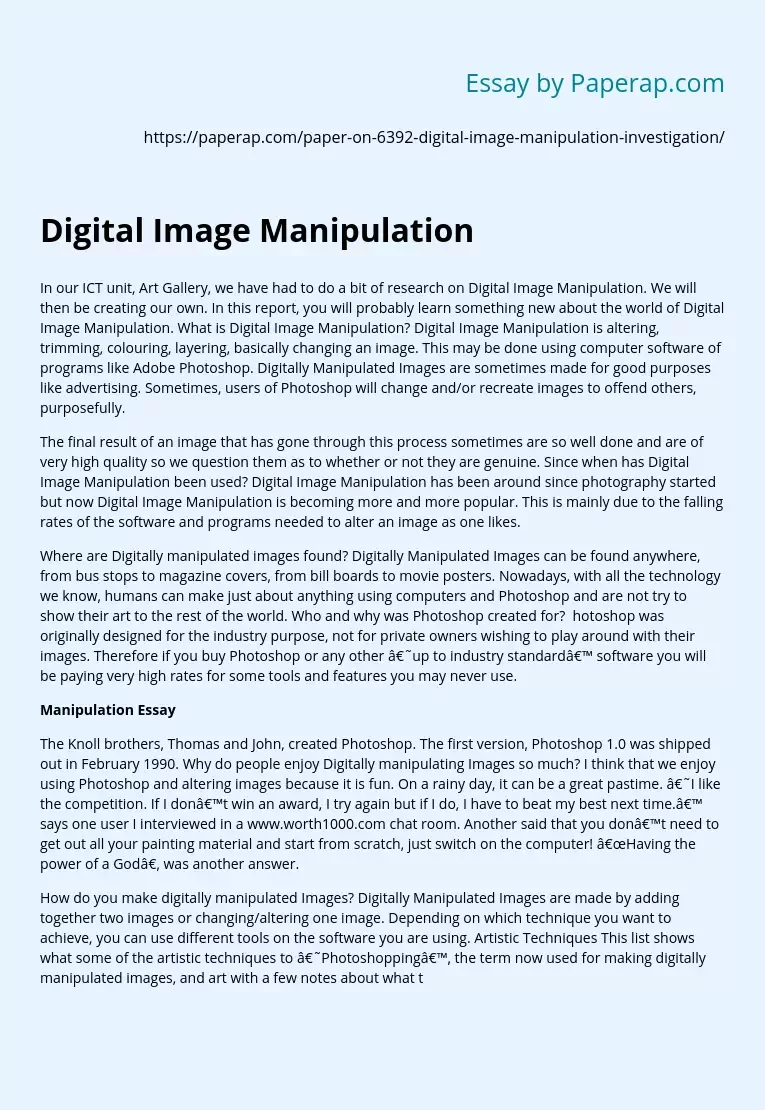Digital Image Manipulation
In our ICT unit, Art Gallery, we have had to do a bit of research on Digital Image Manipulation. We will then be creating our own. In this report, you will probably learn something new about the world of Digital Image Manipulation. What is Digital Image Manipulation? Digital Image Manipulation is altering, trimming, colouring, layering, basically changing an image. This may be done using computer software of programs like Adobe Photoshop. Digitally Manipulated Images are sometimes made for good purposes like advertising.
Sometimes, users of Photoshop will change and/or recreate images to offend others, purposefully.
The final result of an image that has gone through this process sometimes are so well done and are of very high quality so we question them as to whether or not they are genuine. Since when has Digital Image Manipulation been used? Digital Image Manipulation has been around since photography started but now Digital Image Manipulation is becoming more and more popular.
This is mainly due to the falling rates of the software and programs needed to alter an image as one likes.
Where are Digitally manipulated images found? Digitally Manipulated Images can be found anywhere, from bus stops to magazine covers, from bill boards to movie posters. Nowadays, with all the technology we know, humans can make just about anything using computers and Photoshop and are not try to show their art to the rest of the world. Who and why was Photoshop created for? hotoshop was originally designed for the industry purpose, not for private owners wishing to play around with their images.
Therefore if you buy Photoshop or any other ‘up to industry standard’ software you will be paying very high rates for some tools and features you may never use.
Manipulation Essay
The Knoll brothers, Thomas and John, created Photoshop. The first version, Photoshop 1.0 was shipped out in February 1990. Why do people enjoy Digitally manipulating Images so much? I think that we enjoy using Photoshop and altering images because it is fun. On a rainy day, it can be a great pastime. ‘I like the competition. If I don’t win an award, I try again but if I do, I have to beat my best next time.’ says one user I interviewed in a www.worth1000.com chat room. Another said that you don’t need to get out all your painting material and start from scratch, just switch on the computer! “Having the power of a God”, was another answer.
How do you make digitally manipulated Images? Digitally Manipulated Images are made by adding together two images or changing/altering one image. Depending on which technique you want to achieve, you can use different tools on the software you are using. Artistic Techniques This list shows what some of the artistic techniques to ‘Photoshopping’, the term now used for making digitally manipulated images, and art with a few notes about what they are and how they are used in art. Political Art: Caricatures of Political Images or people. Play of words on political subjects. Political Awareness
Texture: Texture can change the mood or ambience of an image. Perspective: A point of view. Often has a vanishing point where all lines meet. The closer an object, the larger. The farther the object, the smaller and the fainter. Humour: To make fun of certain people or societies. Play of words used in images. Patterns and Repetition: Repetition- repeated many times, doesn’t have to be exact. Pattern- also repeated many times but has to be more precise. Patterns and repetitions can be found in the nature, on tiles, on arabesques, in geometric drawings, etc. Colours: Primary colours {red, blue, yellow} are very strong colours. Colour can change a mood or feeling of art. Colours can be used to attract attention or focus on a certain object in the image. Composition and Use of Space: Layout of the image. Make the object that you want to be focused the first thing that the viewer would see.
Digital Image Manipulation. (2019, Dec 05). Retrieved from https://paperap.com/paper-on-6392-digital-image-manipulation-investigation/

